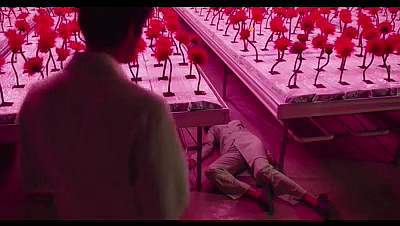Happy Holidays ...... https://www.google.com/search?client=firefox-b-1-d&q=little+joe Little Joe 2019 ----
Alice, a single mother, is a dedicated senior plant breeder at a corporation engaged in developing new species. Against company policy, she takes one home as a gift for her teenage son, Joe.
It’s hard not to notice that the flowers look a bit phallic, and when viewed in closeup, the bulbs, with a bit of red poking out at the top, suggest Venus flytraps just after they’ve had a munch. Years of horror thrillers have geared us to survey a scene like this one and expect, down the road, the eruption of something ghastly: an alien, perhaps, or monster seed pods like the ones in “Invasion of the Body Snatchers.” “Little Joe” wants us to be quietly unsettled by those plants. We look at them and wonder: Is this a nursery from hell?
The answer is yes, sort of. “Little Joe,” is a variation on “Invasion of the Body Snatchers.” ), picks up on the proverbial “Body Snatchers” theme — people turned into sinister conformist replicants of themselves — and updates it to our era in a singular and disturbing way. People take in one smoky burst of that pollen (it happens when the plant spreads its tendrils), and it transforms their mood. They feel happy. But they also feel different. They no longer feel completely like themselves. They look and sound the same, but on some barely perceptible level they don’t act in quite the same way. They’re a bit placid, a bit neutral, a bit in their own zone. They’re no longer engaged — not really — with the outside world. But it doesn’t matter (at least, to them), because the new way they feel is just as good; in fact, it feels better. They want to keep feeling that way. And thanks to the effect of Little Joe, they do. EVERYONE IS CHANGED IN THE END.....the really creepy thing is the loyalty they develop to the plant that’s transformed them. Once they’ve been converted to their new state of weirdly numb contentment, they become fiercely protective of their new way of being; no one is allowed to question it. And that’s the scathing allegorical thrust of “Little Joe.” It presents a landscape of medicated zombies who join in a cult of their own well-being, and who regard their new state as an ideology — not just a way to be but the way to be. Symbolically speaking,
Alice, a single mother, is a dedicated senior plant breeder at a corporation engaged in developing new species. Against company policy, she takes one home as a gift for her teenage son, Joe.
It’s hard not to notice that the flowers look a bit phallic, and when viewed in closeup, the bulbs, with a bit of red poking out at the top, suggest Venus flytraps just after they’ve had a munch. Years of horror thrillers have geared us to survey a scene like this one and expect, down the road, the eruption of something ghastly: an alien, perhaps, or monster seed pods like the ones in “Invasion of the Body Snatchers.” “Little Joe” wants us to be quietly unsettled by those plants. We look at them and wonder: Is this a nursery from hell?
The answer is yes, sort of. “Little Joe,” is a variation on “Invasion of the Body Snatchers.” ), picks up on the proverbial “Body Snatchers” theme — people turned into sinister conformist replicants of themselves — and updates it to our era in a singular and disturbing way. People take in one smoky burst of that pollen (it happens when the plant spreads its tendrils), and it transforms their mood. They feel happy. But they also feel different. They no longer feel completely like themselves. They look and sound the same, but on some barely perceptible level they don’t act in quite the same way. They’re a bit placid, a bit neutral, a bit in their own zone. They’re no longer engaged — not really — with the outside world. But it doesn’t matter (at least, to them), because the new way they feel is just as good; in fact, it feels better. They want to keep feeling that way. And thanks to the effect of Little Joe, they do. EVERYONE IS CHANGED IN THE END.....the really creepy thing is the loyalty they develop to the plant that’s transformed them. Once they’ve been converted to their new state of weirdly numb contentment, they become fiercely protective of their new way of being; no one is allowed to question it. And that’s the scathing allegorical thrust of “Little Joe.” It presents a landscape of medicated zombies who join in a cult of their own well-being, and who regard their new state as an ideology — not just a way to be but the way to be. Symbolically speaking,




















No comments:
Post a Comment